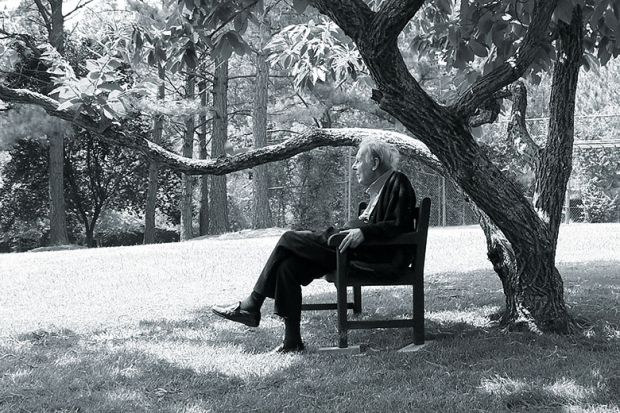Ten years after the leading American eco-thinker Thomas Berry (1914-2009) passed away, two close friends have joined forces with an emeritus professor of English to produce the first biography, a truly magisterial work and magnificent book. Mary Evelyn Tucker and John Grim worked with Berry for more than 30 years as his students, editors and literary executors; they are also the managing trustees of the Thomas Berry Foundation and teach at the Yale School of Forestry and Environmental Studies and Yale Divinity School, where they direct the Yale Forum on Religion and Ecology. All this makes them extremely well qualified to guide us through the complex story of Berry’s life.
Their beautifully produced biography is extensively illustrated and provides close insights into Berry’s background and education, his early work abroad in post-war Germany and China, his religious formation as a member of the Passionist Congregation and the development of his teaching and research programme at Fordham University in New York, where he created the History of Religions Program.
Of special importance was his 1970 foundation of the Riverdale Center for Religious Research on the Hudson River north of New York. Berry lived there for nearly three decades and it was here that he eventually edited and published what have been called his iconic monographs. His first book on the environment was The Dream of the Earth (1988), which soon sold more than 100,000 copies and was reprinted many times. Among titles that followed were The Great Work (1999), Evening Thoughts (2006), The Sacred Universe (2009) and The Christian Future and the Fate of the Earth (2009). The Dream of the Earth is seen by many as Berry’s signature volume as it contains some of his key essays, such as “The Earth Community”, “Creative Energy”, “The Ecological Age” and “The New Story”, but it also includes papers on economics, technology, bioregionalism, patriarchy and the cosmology of peace.
Berry’s path-breaking essay “The New Story” had first been published in 1978, when he called for a coming-together of science and the humanities to narrate the great epic of evolution. Much of his later writing grew out of this essay, which was a response to “the devastating impact of industrial culture on the survival of the planet and on the future of the human”.
Tucker, Grim and Andrew Angyal’s excellent book provides an invaluable resource for studying the many-faceted aspects of Berry’s rich heritage. It also examines in considerable detail important influences on his thought, such as Confucianism and the writings of Pierre Teilhard de Chardin. It vividly conveys the visionary, future-oriented quality of Berry’s attitude and thinking, so deeply rooted in his lively understanding of human-Earth relations and the whole Earth community. The remarkable personal photographs of Berry included in this biography express the warm and sensitive personality of this great thinker and make his presence deeply felt.
This outstanding book provides an indispensable resource for understanding the rich personality of Thomas Berry as a foremost ecological thinker and activist whose influence will reach many people around the world. It remains a task for others to provide a more critical analysis of Berry’s life and thought.
Ursula King is professor emerita of theology and religious studies – and senior research fellow at the Institute for Advanced Studies – at the University of Bristol.
Thomas Berry: A Biography
By Mary Evelyn Tucker, John Grim and Andrew Angyal
Columbia University Press, 360pp, £23.00
ISBN 9780231176989
Published 16 April 2019




